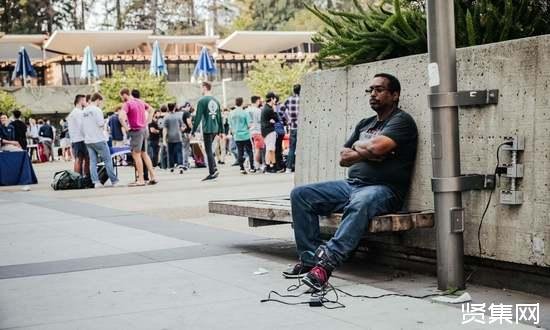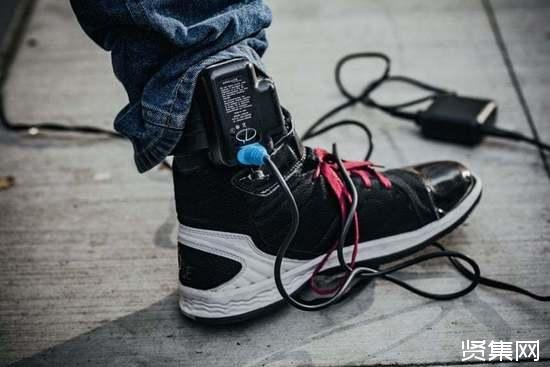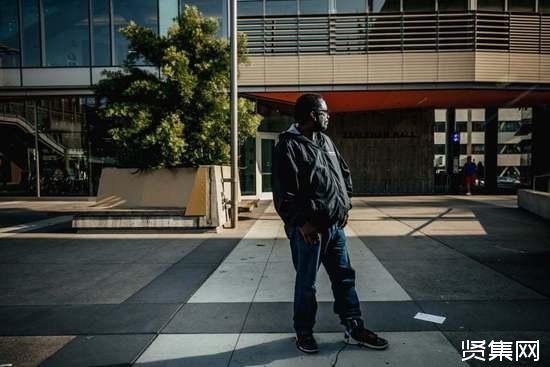According to the Guardian, in the United States, the use of Global Positioning System (GPS) ankle monitors to track criminals is increasing. But for the wearer, this is equivalent to a new form of imprisonment.

Figure 1: In order to pay for the GPS pedal monitor, Willard Birts became homeless. He said, "It's like a rope that entangles my neck."
Every day around 5 pm, the 60-year-old Willard Birts had to find a power outlet. He must then stay with it for two hours while charging the battery on the ankle monitor. If the battery runs out of power or enters San Mateo, Bertz may be sent back to prison while awaiting trial.
Bertz pays $30 a day for the bulky equipment he wears at his ankles, which is $840 a month. It swallowed up all his income and left him homeless, only sleeping in his Ford Escape car parked in Auckland. Bots pointed to the cable that extended from the ankle, slammed through the floor and connected to the wall. "It's like a rope that wraps around my neck. My feet can't land anymore."
According to the latest data, the GPS pedal monitor used by the US criminal justice system is on the rise, increasing by 140% between 2005 and 2015. The government uses these devices to track individual locations to ensure they comply with parole terms, such as staying at home after a specific time each night, or avoiding a specific location. They seem to offer attractive options to replace prisons and opportunities to get along with their families.
But the wearer described it as “digital 镣铆and deprived them of their freedom in a cruel and unexpected way. James KiLGore, who is responsible for the challenging autopsy project at the Media Justice Center, said: "This seems to be a way to replace imprisonment, but it is still imprisonment."
The rules of the ankle monitor vary from place to place, and different crimes have different regulations. They are used before, during, and during probation. In some cases, many counties bear the full cost of this technology. After all, it saves the cost of adding extra beds in the prison. In other cases, the wearer is subject to a fee ranging from $10 to $35 per day.
In addition to financial costs, the ankle monitor introduces new ways for the wearer to return to prison, especially for those from poor and marginalized communities. Kilgorg said: "Once you have electronic equipment on your body, you may be sent back to prison because your bus may be late, the battery may be out of power, or you may not be able to recharge after a power outage."
Private companies sometimes offer their monitoring technology free of charge to tightly funded counties, pushing costs to users. William Edwards, a 38-year-old former office clerk, was asked to wear a GPS pedal monitor for $25 a day between January and April 2017. When the police stopped him in November 2016, he was driving an acquaintance car. The police found drugs in the owner's bag, found guns in the lockers on the dashboard, and arrested two people.
Edwards suffers from chronic myelogenous leukemia. He was placed in the Alameda County Prison in California in December 2016, where health began to deteriorate. The condition he was released was with a GPS monitor. He said: "You only want to have the opportunity to stay at home with people who care about you. But this is terrible. A living nightmare."

Figure 2: Close-up of an ankle monitor that requires several hours of charging per day
Although Edwards was not convicted, the accusation was even revoked, but he was a prisoner in his home for several months and was constantly harassed by LCA, which provides tracking services. LCA asked to know his girlfriend's income so that they could charge a "economic status survey" based on his family income. He said: "I feel that I am dealing with the mafia loan sharks."
Edwards is using legal means to fight back. In early August, he participated in a class action lawsuit against LCA and Alameda, which accused the county of allowing private companies to make profit-driven decisions on civil liberties and denied their legitimate rights. . Edwards et al. accused LCA of extorting fees from imprisonment threats and violating federal extortion.
Restricting freedom is a government function, but when such services are provided by private companies, there is no public monitoring of decisions. In the case of LCA, it is not transparent enough about how it decides to charge fees and how its users ensure that people pay for it. Phil Telfeyan, founding director of Equal Justice Under Law, said: "If someone can't afford anything, there will never be a probation officer who threatens to imprison. We shouldn't let private companies Do this." LCA declined to comment.
Despite the growing number of people using ankle monitors, there are not many rigorous studies showing that they can effectively prevent people from absconding or recidivism or protecting public safety. However, some studies have shown that they are useful for ensuring that sex offenders and drug offenders comply with their parole clauses (such as family imprisonment orders). In many cases, they have increased the administrative burden of probation and parole officials, who have to deal with thousands of daily alerts, errors and false positives. This tendency of "wolves are coming" has led the police to ignore many important warnings, which means that the public has been tricked into a false security state.
In Colorado, a parole named Evan Ebel cut off his ankle monitor before murdering a Denver pizza deliveryman. He then traced the trail of the Colorado Warden and killed him in his home. The parole officer did not realize for a few days that the parole had committed a lot of crimes. In California, sexual assaulter Phillip Garrido wears a GPS monitor, and paroles go to his home at least twice a month. It took the police 18 years to discover that Garrido had kidnapped Jaycee Dugard from an early age and kept him in his garden. During this period, Garrido repeatedly raped Dagard, who even gave birth to two children.
Matthew DeMichele, an international sociologist who studies criminal justice, said: "These monitors are not silver bullets, just tools." However, this did not stop Colorado, Florida, Missouri, Ohio, Oklahoma. The states of Hema and Wisconsin enacted laws requiring life-long GPS surveillance for sex offenders. In the United States, the public disagrees with this small group of people.
The 32-year-old Sarah Pickard is such a sexual assaulter. At the age of 21, she had a sexual relationship with a 13-year-old boy and was charged with three statutory rapes. She confessed to this. Picard was sentenced to one month imprisonment, five years probation and 50 hours of community service. She must also register as a sex offender and complete a treatment plan.
Picard is now in prison and is now married and has two children. Her therapist and probation officer said she was not at risk to the public. However, like other sex offenders in Missouri, Picard wears a GPS ankle monitor 24 hours a day until she is at least 65 years old, when she has the opportunity to apply to the court for removal. She was wearing it when she was a second child.
The device enforces the rules of the Sex Offender Registry, which alerts the local police if Pickard is close to the school or playground. Picard has a special permit to bring his or her children to school, but is not allowed to attend certain parent conferences or take children to the playground. The device is not waterproof, which means she can't swim or shower. In order to prevent others from seeing, Picard avoided wearing shorts or skirts. She wore eight years of loose trousers. In addition, because of the large size, wearing boots is also impossible.
Picard said: "It's hard to imagine wearing a 30-year scene. Imagine how frustrating it is to monitor my life!"

Figure 3: Burts' favorite charging location is on the campus of the University of California at Berkeley.
Reform advocates say that if society believes that some people do not need to go to jail, then the focus should be on rehabilitation and reintegration. Their argument is that money for electronic surveillance can be used for mental health services, drug abuse treatment and employment support. Kilgorg said: "Punitive technology does not solve the fundamental problems people face and the reasons for their final imprisonment."
Prior to his recent arrest, Bertz was sentenced to life imprisonment for “three innocents†for a range of crimes, including robbery at 18 and possession of marijuana. In 2013, he founded a company specializing in the mobile car business in Palo Alto. The company's business boomed until his former partner accused him of domestic violence, and Bertz denied it.
Bertz stayed in prison for 17 months, awaiting trial, during which he owed $20,000 in debt and was released later, provided he was wearing an ankle monitor to detect if he had entered the accused San Mateo County. He works every day at the grassroots civil rights organization All Of Us Or None. In recent weeks, he has been helping to renovate the company's new office in North Auckland. Butts pointed to the plastic box that came out from under the jeans and said, "This makes me unable to pay the bill." Otherwise, he can afford the rent and meals instead of relying on the church's charity. He said: "I only thought about normal life. I hope the past is really a thing of the past."
Jiangsu Lude Electrical Manufacturing Co., Ltd. is a high-tech enterprise dedicated to the research and development, manufacturing, sales and service of weighing equipment for a long time. Truck Scale ,Platform Floor Scale, Bench Scale , Pallet Jack Scale, Portable Truck Axle Scale, Crane Scale , Filling Scale , automatic weighing sytem are our main products, they sold well domestic and abroad.
All Lude products are manufactured strictly in accordance with the quality assurance system, and many of them got CE certificate and OIML approval.
Lude is always on the way of providing faithful service to users around the world.
Electronic Scale,Industrial Scale,Digital Scale,Heavy Duty Scale
Jiangsu Lude Electrical Manufacturing Co.,Ltd , https://www.ludescale.com